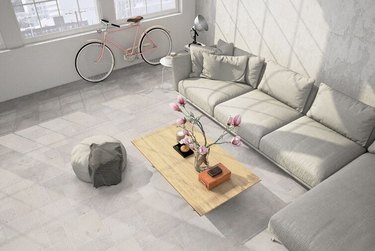Limestone is a relatively soft and common rock used for everything from cement to crushed stone for driveways, or even for making countertops for a kitchen. As a sedimentary rock, formed by sediment settling and compacting together over a long period of time, limestone often contains fossils. As far as hardness is concerned, limestone averages 3 to 4 on a scale of 1 to 10, and it's harder than gypsum but considerably softer than granite.
Mohs Scale of Hardness
Video of the Day
Minerals and stones of all sorts are often ranked according to hardness, which is important to know when choosing materials for specific purposes, such as natural stone walkways, countertops, or even flooring materials. A universal hardness test, called the Mohs Scale of Hardness, ranks these materials based on which materials scratch others and which are easiest to scratch. Diamond sits at 10, the top of the Mohs hardness scale, as it easily scratches any other forms of stone. At the opposite end of the scale is talc, ranking a 1; it's soft enough that it is easily scratched with your fingernail. Graphite, used to make the "lead" in pencils, ranges from 1 to 2, as it's also quite soft.
Video of the Day
Gold, copper, and silver are also softer than limestone, averaging about 3 at their hardest. Common minerals harder than limestone include turquoise, pyrite, and quartz, which range from about 5 to 7 on the hardness scale. Window glass ranks about a 5.5, on average, which means quartz, in particular, has no trouble scratching glass, while gold, copper, or silver cannot scratch glass, but will instead be scratched by it. This means a shard of window glass could scratch limestone as well, although it may be difficult to do since the hardness of glass isn't immensely greater than the hardness of limestone. Marble and limestone are about equally hard, so they may not be able to scratch one another easily.
Limestone Hardness and Usability
Since limestone is fairly soft and makes up about 15 percent of all sedimentary material in Earth's crust, it's incredibly useful, especially for construction. It's hard enough to keep its shape when crushed into smaller stones, making it useful for gravel driveways or as a base layer when pouring cement. Lime used for gardens also comes from limestone. The calcium carbonate in toothpaste also comes from limestone, serving as a gentle abrasive to help clean teeth. Limestone is a key ingredient in cement, so any cement features in or around your home also contain limestone.
Limestone's hardness gives it a bit of the best of all worlds, as it's soft enough to easily crush or cut, but hard enough to maintain its form when necessary. Its mineral content makes it useful for gardening.
